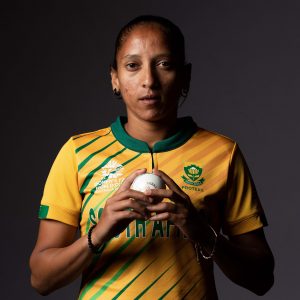Hilton-Smith is proud of her legacy in women’s football
The former Safa technical director – who has played every role in the national team, from that of player, team manager and coach – calls on corporates to sponsor women’s football.
Author:
29 May 2020

Fran Hilton-Smith never thought that the sport she loves would put her life in harm’s way. But it did. Fortunately, that did not deter her from working hard to ensure women’s football in South Africa grows into one of the most supported women’s sports in the country.
The former drummer and bass guitarist of Basadi Women of Jazz was bitten by the football bug when she was a little girl growing up in Germiston, on the East Rand. “Franzo” started her playing days as a goalkeeper, for that was the only position the boys she played with allowed her to occupy.
“Slowly I started playing, getting onto the field and developing my talent,” she said.
At 17, she and a couple of friends formed a women’s football team that would play at the Germiston Callies Stadium. This opened the door for her to get selected in an Eastern Transvaal team that competed against other regions.
As a talented left footer, she was part of the Eastern Transvaal side for a decade. South Africa’s exclusion from the international arena shattered her dreams of representing the country at the highest level. But the lack of women’s coaches at the time gave her a new dream.
“I decided to get into coaching which was very difficult,” she said. “I was the only woman then with some of the big boys who were getting into coaching like Shakes Mashaba, Trott Moloto and all the big guys. They were a little apprehensive but I wasn’t going to give up. I pushed my way up to a CAF high level course.”
Hilton-Smith was at the forefront when Banyana Banyana was established. She managed and coached the team in 2000 and made sure that players had what they needed.
Durban Ladies owner and one of the longest serving women’s football administrators in South Africa, Mary-Jane Sokhela, says Hilton-Smith has given a lot to the game in this country and in the continent. When Hilton-Smith was president of the South African Women’s Football Association (Sawfa) Sokhela was the vice president. They go back a long way.
Related article:
“The first Kappa tracksuits that we got, we found on our own with Fran. At some point we would wear Reebok while Bafana Bafana was wearing Kappa. We would wear that because that was the only thing that Fran could get,” said Sokhela.
The formation of Banyana
“I met this lady, Dara Caroll, who is now the brand manager at Kaizer Chiefs and I forced her to become the manager of Banyana. We asked Emy [Casaletti-Bwalya], who was the head of Kappa then, to sponsor Banyana with kits. She gave us one kit, one [pair of] tracksuits. We kept that one kit at my house. We’d play a match and then collect the kit, the socks, the bags and I would bring them home. Dara and I would wash them, pack them away until the next game. We used that kit for two years. We got nothing from Safa,” Hilton-Smith recalled.
The introduction of Banyana at the South African Football Association (Safa) was met with a lot of resistance by members of the association who didn’t believe that women’s football had a place in the country. Hilton-Smith alleges that members of the association wanted to take over and have absolute control of the Banyana team that they had been running and building. However, founding members of Sawfa stood their ground and roped in late former Minister of Sports, Steve Tshwete, to the matter.
“It became very acrimonious and dangerous. I got shot at and rocks thrown at me. I wrote consistently to the then minister of sport, Steve Tshwete, and the DG of sport, Mthobi Tyamzashe, complaining that Safa, Molefi (Olifant) and Stix (Solomon Morewa), were entertaining a group who called themselves the crisis committee. They shouldn’t have been entertaining them because we (Sawfa) were a legitimate body. I’m still very bitter that Safa didn’t recognise and support Sawfa because we were a legitimate, well-structured body,” Hilton-Smith said.
Related article:
“During the Pickard commission [that looked at the financial mismanagement at Safa] a lot of things happened that I never thought of. Fran’s car was shot at a couple of times. At some point I was met by unknown people at the airport sent by the judge to take me to safety because he was tipped off about what would happen to me. It was rough. I didn’t know football could go as far as bullets. If you saw Fran’s car then, it was scary. Luckily, she was not in the car. But it didn’t happen [only] once, even at her house,” added Sokhela.
Banyana finally at the World Cup
In the early days, Banyana Banyana did not even have team doctors or security personnel. These struggles did not deter Hilton-Smith though. She continued building the team. It took over two decades to see her dream come true of seeing Banyana play against the best teams in the world at the 2019 Fifa Women’s World Cup.
“I looked at a lot of footage of the 1991 World Cup where Nigeria represented us, which the USA won. I realised that we had the best players in the world, skill wise. And I wanted them to go to the World Cup. I wasn’t gonna give up. It took me 21 years to get them to the World Cup,” she said.
Despite all the work that she put in to make Banyana and women’s football fashionable in the country, there was no funding from the association to get her to France. The invitation to the Fifa Global Women’s Football Convention just before the start of the World Cup was her ticket to seeing Banyana play on the biggest stage.
Her passion for the women’s game opened doors for her. She has worked for Fifa, the world football federation, in different positions, including being a member of the World Cup committee since 2002. She was appointed by Tatjana Haenni, former head of women’s football, to do the technical report for the 2002 Fifa Under-19 Women’s World Championship in Canada. She has done work on every other women’s global competition since then.
Inspiring the next generation
Although she was allegedly forced to retire from Safa where she was the technical director for women’s football, Hilton-Smith believes that she has done enough for the next generation of administrators to take over at the association. She also says it is time women get to lead at the Confederation of African Football (CAF) level.
During her tenure as an instructor at Fifa and CAF, Hilton-Smith trained 87 administrators and 21 women coaches. She is proud of Simphiwe Dludlu, a former student of hers, who has gone on to become the only African woman coach to obtain a Uefa B coaching licence. Dludlu has also had 13 students under her graduate with degrees from the University of Pretoria’s High Performance Centre. Lydia Monyepao, Dludlu and former national women’s Under-17 coach Sherly Botes are some of the former players that Hilton-Smith believes will become incredible football administrators.
Related article:
“My vision came true, it took me many years and lots of pain and suffering but it was all worth it for me. I’d change a few things like the shooting and bricks being thrown at me but a lot of it was well worth it. The legacy is there. I am reaping the fruits of my hard work,” she said.
Like many, she believes that a lot can still be done to grow women’s football in the country. She reckons that the best way for the Safa Women’s National League (SWNL) to become successful is having professional teams in the premier division adopt the current teams. In its inaugural year, the SWNL completed the season without a title sponsor and was faced by other teething problems, among them the late arrival of referees.
“Why don’t big companies that produce make-up and clothes sponsor women’s sports and not just football? Maybe the head of the make-up thingie is a man who doesn’t give a shit, I don’t know. Why doesn’t the government give more tax rebates to companies that sponsor women’s sport? I’ve never understood that. That’s the problem with the national league, it’s got to have a sponsor to function,” she said.



